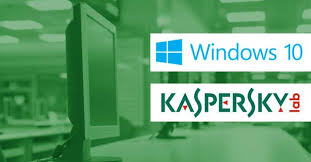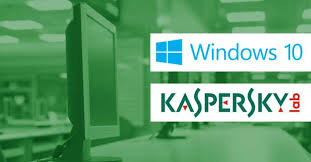
After the U.S. technology giant Microsoft agreed to change how it delivers security updates to Windows users, the Moscow-based cyber security firm Kaspersky Lab has said that it was ready to withdraw its antitrust complaints made in Europe against the U.S company.
It is almost a year that Kaspersky had levelled allegations against Microsoft, including that the later had erected unfair obstacles for independent security vendors on its Windows 10 operating system, and now, nearly after a year of disputes, both companies simultaneously announced a resolution to their issues.
Third party antivirus providers were unfairly harmed in the manner in which it distributed its own Defender antivirus software on Windows 10, is the allegations that Kaspersky Lab had brought in June against Microsoft with the general complaint that Microsoft was abusing its dominance in the personal computer market.
In order to make users adopt Defender, Microsoft had removed Kaspersky's antivirus software when customers installed Windows 10, founder of the Russian company Eugene Kaspersky had said at the time. According to him, the Microsoft product was an "inferior" product.
Microsoft said that its goal was to help protect Windows 10 customers from cyber security threats and had denied breaking any laws at that time.
Before software updates are launched to help mitigate compatibility issues, Microsoft would work more closely with antivirus vendors, the U.S. company said in a blog post published late on Wednesday.
The Redmond, Washington-based company said that it will provide vendors more visibility and certainty around its update release schedules and before and after subscriptions, it will also allow antivirus providers to issue their own alerts and notifications to customers.
In a statement, Kaspersky said it was "taking all steps necessary" to withdraw its antitrust complaints made with the European Commission and Germany's national competition regulator against Microsoft and added that Microsoft's proposed approach had addressed its concerns raised with Russia's Federal Antimonopoly Service.
Om the issue of how "antivirus services should operate in the Windows ecosystem to help ensure a safe environment for Windows users", the two companies had held "fruitful discussions" in recent months, it added.
In recent months, U.S. intelligence officials and lawmakers have been m mounting accusations against Kaspersky Lab that the Russian company may be vulnerable to Russian government influence and the detente comes a midst such rising accusations and allegations.
On the issue of Kaspersky Lab having helped any government conduct cyber espionage or on the reported and alleged ties with the Russian government, the antivirus vendor has vehemently denied all allegations.
(Source:swww.reuters.com)
It is almost a year that Kaspersky had levelled allegations against Microsoft, including that the later had erected unfair obstacles for independent security vendors on its Windows 10 operating system, and now, nearly after a year of disputes, both companies simultaneously announced a resolution to their issues.
Third party antivirus providers were unfairly harmed in the manner in which it distributed its own Defender antivirus software on Windows 10, is the allegations that Kaspersky Lab had brought in June against Microsoft with the general complaint that Microsoft was abusing its dominance in the personal computer market.
In order to make users adopt Defender, Microsoft had removed Kaspersky's antivirus software when customers installed Windows 10, founder of the Russian company Eugene Kaspersky had said at the time. According to him, the Microsoft product was an "inferior" product.
Microsoft said that its goal was to help protect Windows 10 customers from cyber security threats and had denied breaking any laws at that time.
Before software updates are launched to help mitigate compatibility issues, Microsoft would work more closely with antivirus vendors, the U.S. company said in a blog post published late on Wednesday.
The Redmond, Washington-based company said that it will provide vendors more visibility and certainty around its update release schedules and before and after subscriptions, it will also allow antivirus providers to issue their own alerts and notifications to customers.
In a statement, Kaspersky said it was "taking all steps necessary" to withdraw its antitrust complaints made with the European Commission and Germany's national competition regulator against Microsoft and added that Microsoft's proposed approach had addressed its concerns raised with Russia's Federal Antimonopoly Service.
Om the issue of how "antivirus services should operate in the Windows ecosystem to help ensure a safe environment for Windows users", the two companies had held "fruitful discussions" in recent months, it added.
In recent months, U.S. intelligence officials and lawmakers have been m mounting accusations against Kaspersky Lab that the Russian company may be vulnerable to Russian government influence and the detente comes a midst such rising accusations and allegations.
On the issue of Kaspersky Lab having helped any government conduct cyber espionage or on the reported and alleged ties with the Russian government, the antivirus vendor has vehemently denied all allegations.
(Source:swww.reuters.com)














